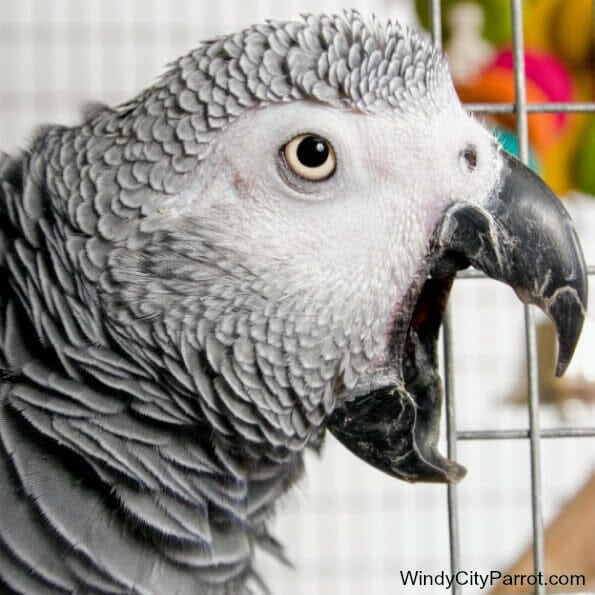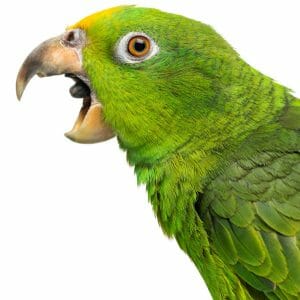Last Updated on by Mitch Rezman
Not all “ parrots” scream.
South American birds including conures and macaw parrots as well as some Australian parrots like Moluccan cockatoos can be quite noisy. Conversely, African parrots from the poicephalus family are fairly quiet like Senegals, Myers, and Red Bellies.
Big birds like Moluccan cockatoos can scream quite loudly literally at levels that exceed the noise 747 Jumbo jet landing ( approximately 157 decibels).
Parrots scream to communicate.
The worst thing you can do when a parrot is screaming is yell “shut up”, because when you do, the bird thinks it has your attention and will “squawk squawk squawk” back engaging the conversation that you just enabled.
Parrot vocalizations can have many many meanings.
Everything from “I’m hungry” to “I’m lonely to please talk to me”.
Generally in the wild when birds go silent, danger is imminent. Otherwise, they go about their business of squawking to each other about the daily chores of finding food, mates and having fun.
For persistent screamers, it’s best to let them have at least 15 to 30 minutes of scream time per day allowing the parrot to get it out of its system. To quiet a screaming bird you can use a technique called redirection.
Place a saucepan and a wooden spoon out of the bird’s line of sight. When the bird starts to scream incessantly, leave the room then grab the pot and spoon (out of the parrot’s eyesight. Bang-bang-bang the spoon against the pot which will usually quiet the bird because it will wonder what that sound is.
In a few moments, we enter the room praising the bird in a cheery voice for being good while rewarding it for silence with a treat that you had around the corner.
If you do this on a regular basis you can extend the time that you take to enter the room. The longer the silence, with the bird understanding it will be rewarded for not screaming.
Hopefully.
We speak bird @ Windy City Parrot which means that we take the time to learn the nuances of our bird’s “voice” in a captive environment. Screaming triggers can range from hunger to other human flock members or feathered flock members.
Uneven lighting cycles throughout the year or even small environmental changes like the movement of a piece of artwork or a piece of furniture.
Our Senegal Peaches has a distinct sound she makes specifically indicating she’s unhappy that her birdcage door is not open the moment her cage light comes at 8:20 AM CST. The sooner you learn to speak bird, the sooner you can get your parrot to stop screaming.
Written by Mitch Rezman
Approved by Catherine Tobsing
Author Profile
Latest entries
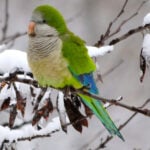 The Traveling BirdJune 26, 2025Can You Name 5 Parrot Species That Are Living Wild in the USA?
The Traveling BirdJune 26, 2025Can You Name 5 Parrot Species That Are Living Wild in the USA? Bird BehaviorJune 26, 2025How is it Parrots Are Problem Solvers Social Animals and Even Use Tools?
Bird BehaviorJune 26, 2025How is it Parrots Are Problem Solvers Social Animals and Even Use Tools?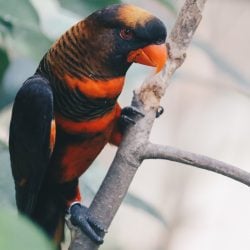 Bird & Parrot AnatomyJune 25, 2025How a Tiny Chemical Modification Makes Parrots Nature’s Living Paintings
Bird & Parrot AnatomyJune 25, 2025How a Tiny Chemical Modification Makes Parrots Nature’s Living Paintings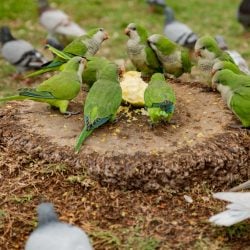 PigeonsJune 20, 2025How Do Parrots Thrive in Cities Outside Their Native Habitats?
PigeonsJune 20, 2025How Do Parrots Thrive in Cities Outside Their Native Habitats?
